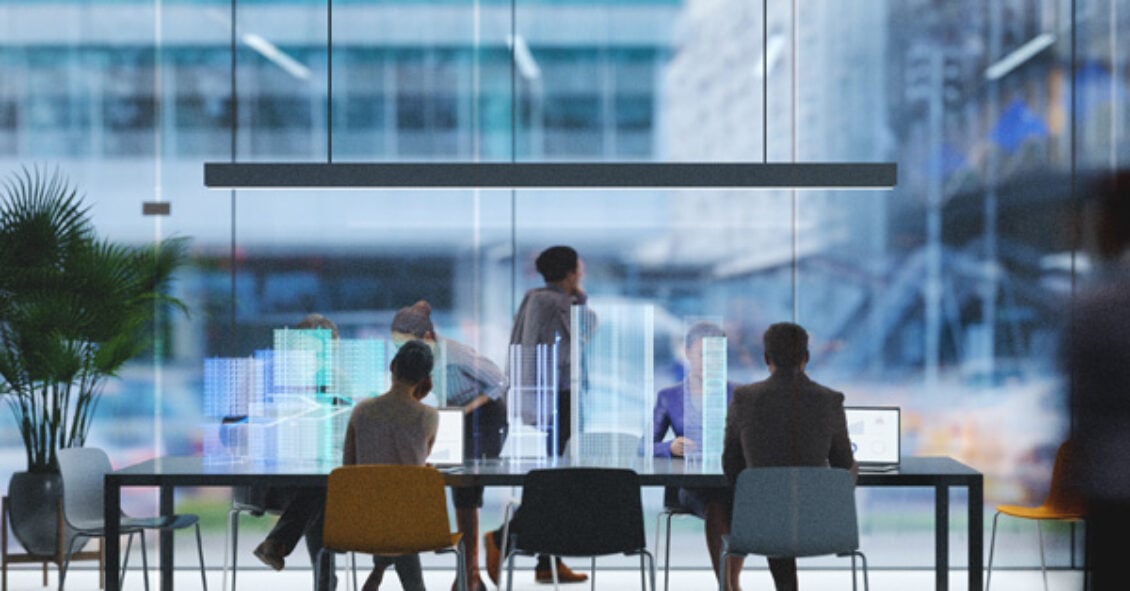
How service providers can partner with Global Capability Centers (GCCs) to shape the next frontier of Retail and Consumer Packaged Goods (RCPG) transformation
Technology is evolving faster than ever, redefining how consumers live, shop, and engage with brands. The RPCG industry, long driven by scale and efficiency, is now being reinvented by data, cloud, Artificial Intelligence (AI), and design-led experiences.
A few years ago, the industry’s digital ambitions were incremental, better apps, smoother checkouts, faster deliveries. Today, transformation is existential. Consumers expect brands to anticipate their needs, connect authentically, and operate sustainably. For many enterprises, this means rethinking their business models entirely.
Retailers are responding with bold experimentation. Walmart is using Generative AI (gen AI) to build personalized shopping assistants that plan meals and order groceries in one step. Unilever’s digital twins simulate factory operations to optimize energy use. H&M leverages AI to predict fashion trends and curb overproduction. Coca-Cola co-creates limited-edition flavors with AI, blending product and digital experiences. And IKEA’s Augmented Reality (AR) app lets shoppers visualize furniture in their own spaces, seamlessly merging online and in-store journeys.
Retail is no longer about selling products, it’s about building connected ecosystems that fuse personalization, purpose, and convenience. To meet these rising expectations, RPCG enterprises are increasingly turning to GCCs as engines of scalable innovation and digital transformation.
Reach out to discuss this topic in depth.
GCCs – The new core of reinvention
The modern GCC has evolved far beyond its origins as a back-office or cost-efficiency play. Today, these centers serve as strategic innovation engines, integrating technology, analytics, and design thinking to enable enterprise-wide transformation.
While industries such as Banking, Financial Services and Insurance and technology led early GCC adoption, RPCG enterprises, particularly mid-sized firms, have been slower to mature. This is changing rapidly, RPCG GCCs in India grew at ~8–9% annually between 2021 and 2024. This number is projected to accelerate, driven by the rise of digital commerce, AI adoption, and supply chain modernization.
GCC transformation in RPCG typically spans three dimensions: process, functional, and technology modernization.
- Process transformation is reengineering core operations for agility and efficiency, using intelligent automation to optimize supplier management, returns processing, and forecasting
- Functional transformation builds domain capabilities across marketing, supply chain, finance, and customer experience, powering use cases such as AI-led personalization and virtual product trials
- Technology modernization enables both process and functional transformation, with GCCs driving cloud migration, unified data lakes, and gen AI analytics for predictive insights and faster decision-making
Together, these shifts are positioning RPCG GCCs not just as delivery arms, but as strategic orchestrators of innovation and growth.
Tesco: Turning a GCC into a growth catalyst
A prime example of this evolution is Tesco, one of the world’s largest retailers. Its Bangalore-based GCC has transformed from a support function into a strategic driver of global transformation.
The center brings together experts across data science, engineering, operations, and finance to solve complex enterprise challenges. It has developed:
- AI-driven refrigeration monitoring systems that reduce food waste and energy consumption
- Robotic automation that simplifies returns management and speeds up reverse logistics
- Advanced analytics platforms that forecast demand, optimize inventory, and improve shelf availability
Tesco’s example reflects a broader industry shift, GCCs are no longer passive delivery units but active contributors to growth and innovation. As more RCPG companies embrace this model, the ability to scale transformation effectively becomes the next challenge.
Bridging the innovation gap: How service providers power retail reinvention
While global leaders such as Tesco have successfully transformed their GCCs into engines of digital innovation, many RPCG enterprises still struggle to replicate that success. Several factors hold them back:
- Fragmented technology ecosystems that prevent seamless integration of digital capabilities across business functions
- Limited access to advanced digital tools and platforms, slowing the pace of modernization
- Shortage of specialized AI, analytics, and automation, talent, constraining scalability and innovation velocity
- Transactional or support-focused GCC models that limit cross-functional collaboration and strategic influence
- Lack of agile structures and innovation frameworks needed to convert pilots into enterprise-wide transformation
While these challenges slow the pace of transformation, Service Providers are helping bridge the gap, acting as catalysts that enable GCCs to accelerate innovation and scale impact. The infographic below highlights how service providers empower GCCs to evolve from operational enablers into strategic transformation hubs.

Across the RPCG landscape, leading enterprises are already collaborating with service providers to translate this model into action, building next-generation GCCs that fuse technology, talent, and innovation at scale. The following partnerships illustrate how these collaborations are redefining the future of retail and consumer goods transformation.
Lululemon and ANSR – GCC setup: From delivery hub to digital innovation engine
When Lululemon set out to expand its digital and technology footprint, it partnered with ANSR to establish its Bengaluru GCC. What began as a traditional delivery center quickly evolved into a global innovation hub driving AI, analytics, and digital commerce initiatives.
Today, the center plays a pivotal role in creating hyper-personalized shopping and fitness experiences, seamlessly blending technology with Lululemon’s community-driven brand ethos. For ANSR, it’s a powerful example of how a GCC setup can be designed from day one to scale innovation, not just execution.
Coforge and a leading U.S. retailer – GCC transformation: Scaling gen AI for supply chain excellence
Coforge partnered with a leading U.S. retailer to reimagine its GCC as a high-performance, AI-enabled supply chain hub. By infusing gen AI across warehouse operations, logistics, and planning, the center is driving tangible business outcomes, faster deliveries, optimized routes, and more empowered teams. A gen AI-powered self-service bot now helps employees make smarter, data-driven decisions every day. This transformation reflects how providers can help GCCs move from process efficiency to continuous innovation.
Fractal and a global beverage leader – GCC transformation: From data to decision intelligence
For a global beverage major, Fractal helped elevate its GCC from a reporting function to a true decision-intelligence hub. By embedding gen AI-driven analytics, the center now delivers real-time insights, automates reporting, and supports leadership with faster, more confident decisions. What was once a data support unit has become a strategic command center, showing how providers can turn GCCs into the brain of enterprise decision-making.
What’s next for RPCG transformation
As enterprises continue to accelerate cloud, AI, and data-led modernization, GCCs are evolving into the strategic orchestrators of transformation, driving innovation, agility, and business impact at scale. For service providers, this shift marks a new chapter of collaboration. Those that can help GCCs reimagine legacy architectures, embed scalable AI and analytics capabilities, and build unified data ecosystems will play a defining role in shaping the next phase of RPCG transformation.
The RPCG industry now stands at a pivotal moment. As digital maturity deepens, GCCs are shifting from efficiency-focused delivery arms to the architects of enterprise-wide reinvention. This evolution will reshape talent models, delivery approaches, and collaboration patterns, positioning GCCs as central to how the industry innovates, scales, and competes in the years ahead. Over the next few years, five key shifts will define this transformation:
- Growing co-existence with service providers
The interplay between GCCs and service providers will deepen. Provider-assisted GCC setups market is projected to grow at 44% Compound Annual Growth Rate (CAGR) between 2024 and 2027, rising from US$ 3.0 billion to US$ 8.9 billion. The provider-supported GCC transformation market, valued at US$3.2 billion in 2024, is expected to reach US$10.4 billion by 2027, growing at a robust 49% CAGR. Notably, the RPCG sector is expected to be one of the fastest-growing GCC segment after BFSI, driven by increasing investments in AI, digital commerce, and data-led transformation
- Expansion into new functions
By 2027, GCCs will own a broader portfolio of digital and business capabilities that were once centralized or outsourced. Functions such as digital marketing, brand analytics, product innovation, sustainability reporting, and AI governance are emerging as new frontiers of GCC ownership in the RPCG space
- A new talent mix
GCCs are moving beyond traditional process operators toward higher-value digital and strategic roles. By 2027, talent demand will tilt heavily toward product managers, data translators, gen AI trainers, and platform engineers, reflecting the growing integration of AI and analytics into everyday decision-making
- Rise of mid-market participation
Mid-sized enterprises are rapidly joining the GCC movement, inspired by pioneers such as Falabella India and Hy-Vee Global Tech. These firms are leveraging GCCs for digital product development, customer analytics, and platform engineering to compete more effectively with global peers
Together, these shifts mark a defining moment for the RPCG industry. GCCs are no longer peripheral enablers, they are becoming the architects of transformation, shaping how the world’s most dynamic consumer brands design, deliver, and scale digital experiences.
If you found this blog interesting, check out two of our latest PEAK reports, Global Capability Center (GCC) Transformation Capabilities In India – PEAK Matrix® Assessment – Everest Group and Retail Services PEAK Matrix® Assessment 2025 – Everest Group Research Portal, which both delve deeper into the RCPG sector.
If you have any questions or want to discuss the RCPG sector in more depth, please contact Sanchita Gupta ([email protected]), Ravneet Kaur ([email protected]) and Abhilasha Sharma ([email protected]).











